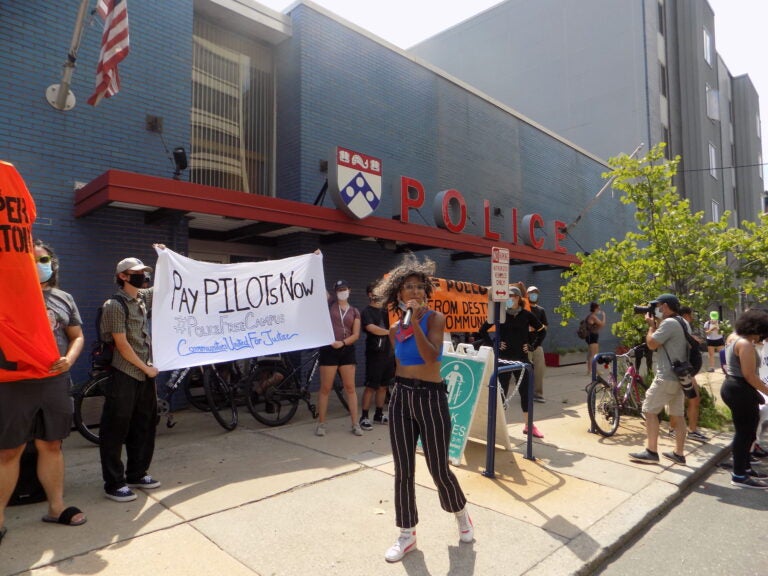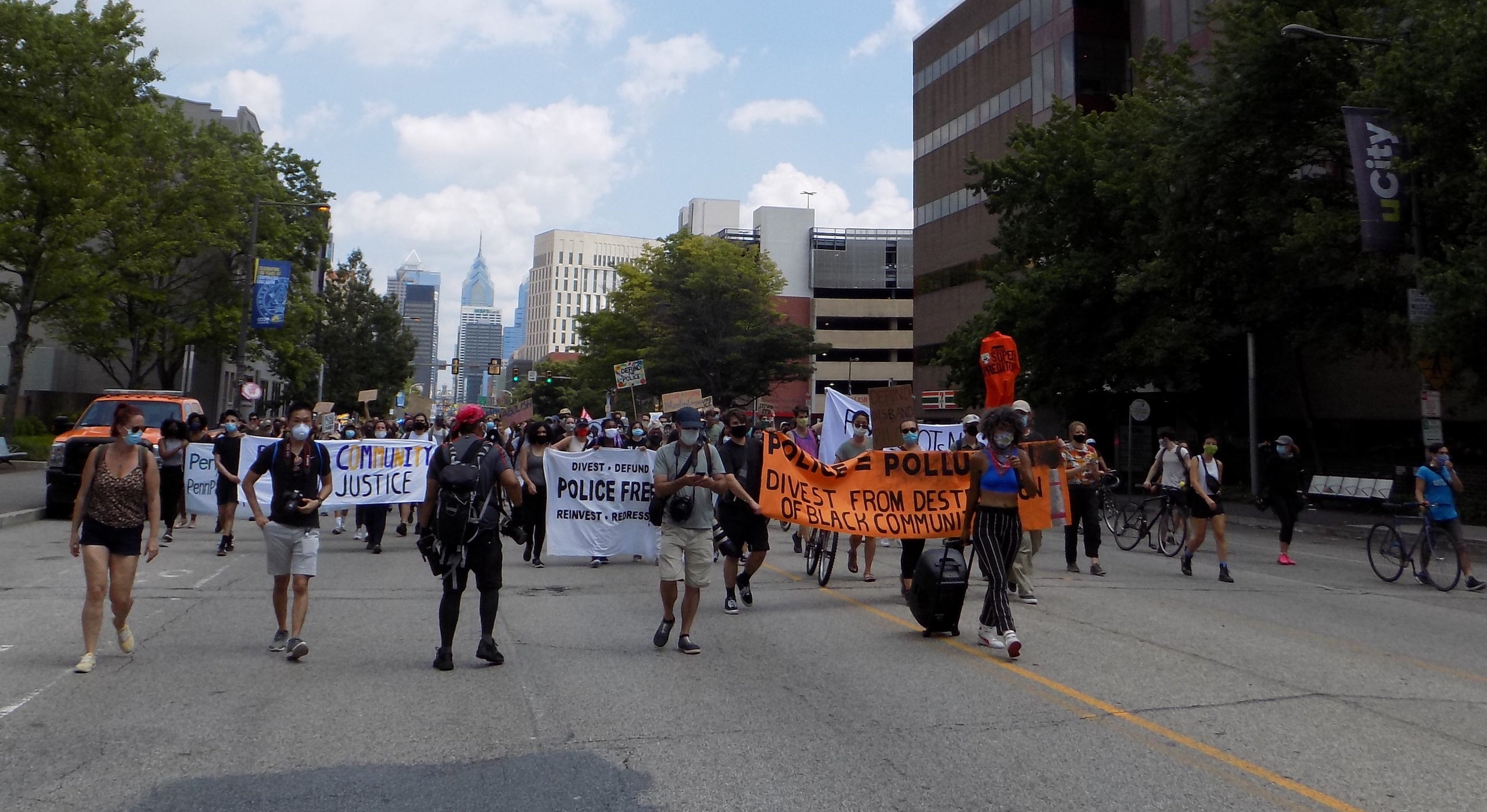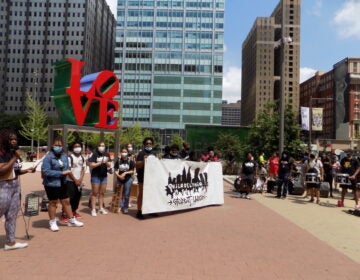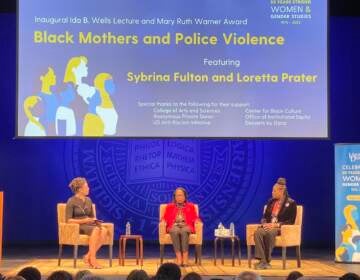Marchers push Drexel, Penn to dissolve private police forces by 2025
Residents near Philly’s colleges and universities have long complained of racial profiling by campus police, who are less accountable to the public.

"Safety does not mean more policing, it means more resources," said Sam Rice. (Ximena Conde/WHYY
Updated: 5:30 p.m.
___
As protests drawing attention to racist systems enter their third month, calls to defund the private police forces employed by Philadelphia colleges and universities continue.
On Sunday afternoon, roughly 200 demonstrators with a slew of organizations — including Drexel Community for Justice, Penn Community for Justice, Philadelphia Black Radical Collective and Reclaim Philadelphia — gathered for a march demanding Drexel University and the University of Pennsylvania dissolve their private police departments by 2025.
The group marched to Penn police headquarters, chanting, “Who protects us? We protect us!”
The group is headed to Penn police HQ at 40th and Market pic.twitter.com/fRuQkM4xWL
— Ximena Conde (@RadioXimena) August 9, 2020
For years, residents living on the blocks surrounding these college campuses have described private police officers who overstep their jurisdiction and racially profile neighbors, while being less accountable to the public than other police forces.
“Sometimes they really mean well,” Tianna Williams, a Philly native and engineering student at Drexel, said of police. “Again, it’s just that recognition of the disparity between treatment of white students and white people that are in this community versus Black and brown people of color.”
Williams, who is also president of Drexel’s Black Action Committee, said on the whole, students of color don’t feel safer with these officers on patrol because “there’s a lot more that they’re doing wrong.”
Saudia Durrant, an organizer with the Philadelphia Student Union, an organization trying to remove police from public schools, was less forgiving.
“Campus police are used to protect [students] by demonizing, terrorizing and assaulting community members,” she said.
At 33rd and Market where Drexel and Penn students are calling on those universities to disband their private police forces by 2025 pic.twitter.com/HLdXsgvRql
— Ximena Conde (@RadioXimena) August 9, 2020
Drexel and Penn police offered city police an assist in West Philly the day the PPD shot rubber bullets and tear-gassed 52nd Street residents.
While the campus police didn’t deploy any of these weapons on residents, they were about a mile away from their patrol area wearing tactical gear, according to The Philadelphia Inquirer.
Fed up students and residents now want the universities to immediately slash their police budgets by half, as well as to invite stakeholders, including residents, to a committee that would come up with the plan to eliminate their private police forces.
That money, protestors argue, should go to the community.
Shoshana Akins is a Drexel alumna with a background in public health, and lives on 52nd Street where police tear-gassed her on May 31.
It’s her belief that police aren’t needed anywhere in Philly and the universities could play an influential role in addressing housing insecurity and hunger, if they redirected the money they’re currently spending on policing.
“Communities will be healthier, people will be able to take care of their neighbors and we don’t need police,” Akins said.
Though nonprofits in Pennsylvania aren’t required to pay property taxes, there is a model where they can opt to send money to their city governments.
Restitution for “the decades of exploitation to Black and Brown communities in Philadelphia,” the groups said in their Facebook event for Sunday’s march, can come in the form of payments in lieu of taxes or PILOTs.
Imagine, said Robert Saleem Holbrook, executive director of the Abolitionist Law Center, if the funds funneled into Penn’s police headquarters went to an Education Equity Fund to support the city’s public schools instead.
Holbrook said that investment “would make more of an impact on the shootings, it would make more impact on the deaths, it would make more impact on healing” communities surrounding the universities.

Protesters also want the universities to release public safety budget information from the past 20 years, and to disclose any donations made to the Philadelphia Police Department and the Philadelphia Police Foundation.
“We’re really just asking for demilitarization and have those resources and those funds be used toward stuff that’s actually going to help the community,” said Williams.
A spokesperson for Penn did not respond to a request for comment.
Drexel pointed to new initiatives the university launched in June to address community concerns, including the creation of a new Center for Black Culture and an independent review of their police force.
“The University has heard the concerns being raised within the Drexel community and is continuing to develop ways to foster productive dialogue and work collaboratively to find solutions,” read a university statement.
Still, protesters are unsatisfied with the response and reject the idea that the review can be unbiased when led by former Philadelphia Police Commissioner Charles Ramsey.
Protesters called for Drexel to cut ties with Ramsey and for Penn’s vice president for public safety, Maureen Rush, to resign because of the department’s role in assisting the PPD on 52nd Street.

Get daily updates from WHYY News!
WHYY is your source for fact-based, in-depth journalism and information. As a nonprofit organization, we rely on financial support from readers like you. Please give today.






